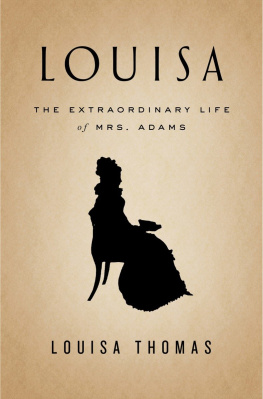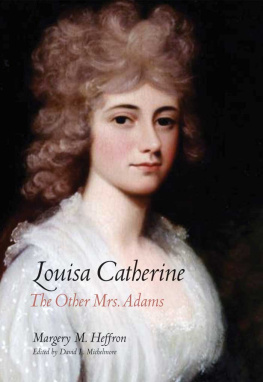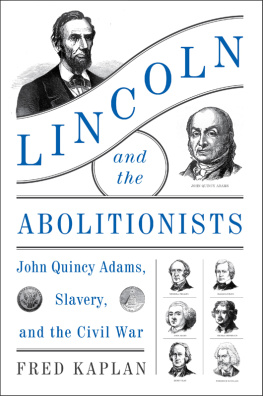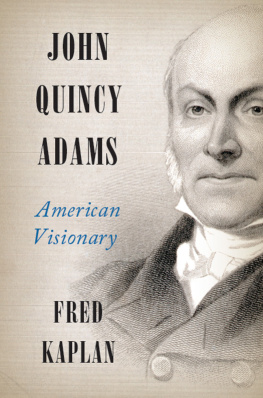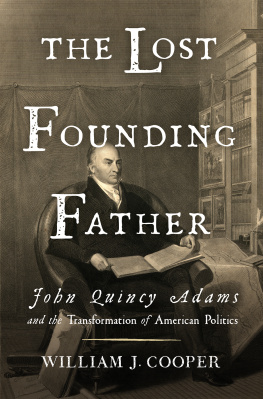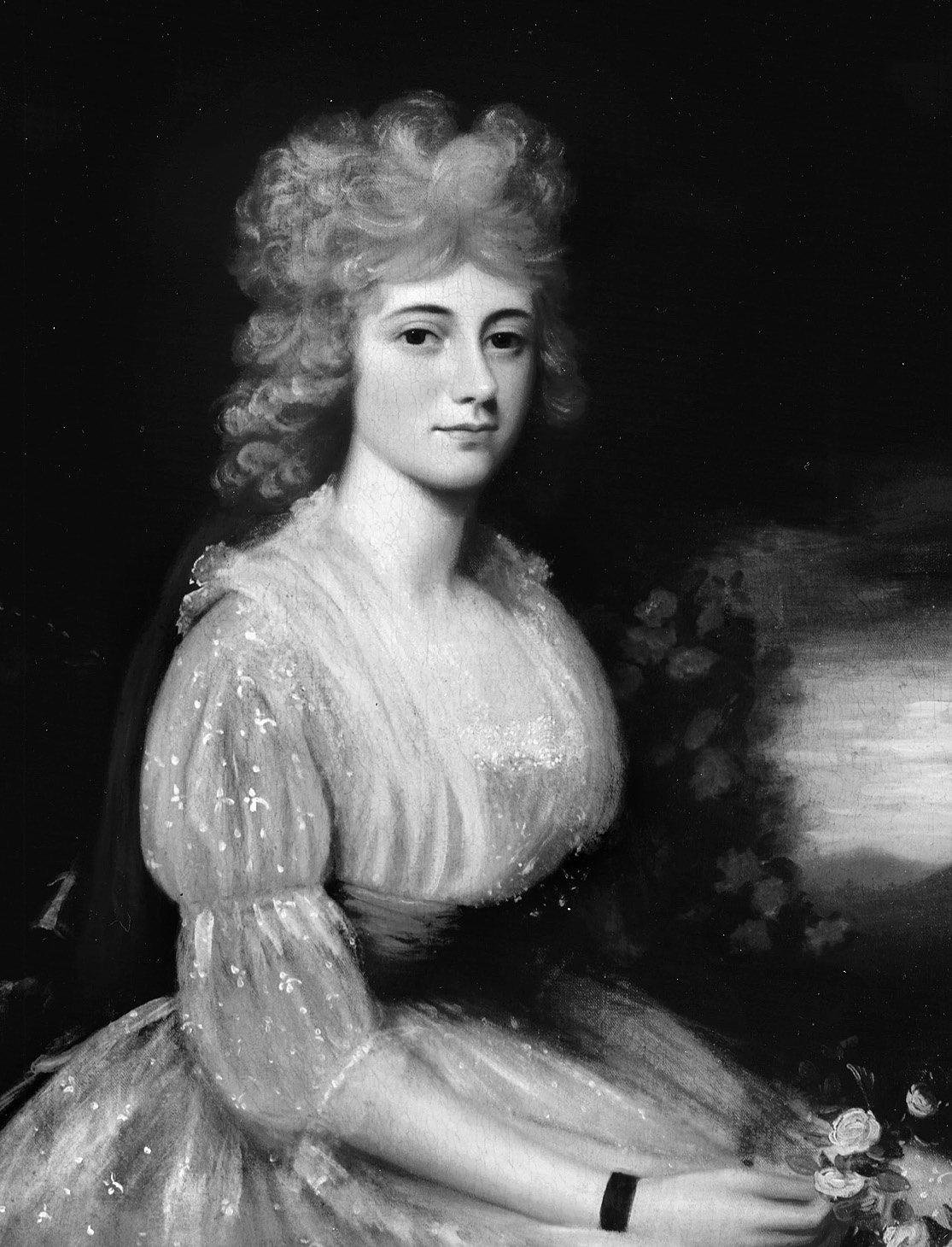Penguin supports copyright. Copyright fuels creativity, encourages diverse voices, promotes free speech, and creates a vibrant culture. Thank you for buying an authorized edition of this book and for complying with copyright laws by not reproducing, scanning, or distributing any part of it in any form without permission. You are supporting writers and allowing Penguin to continue to publish books for every reader.
INTRODUCTION
L OUISA C ATHERINE A DAMS waited at the doors. She was easy to overlooksmall and slight and nearing fifty, with shadows beneath her large dark eyes. But that night, January 8, 1824, she stood where she would be seen, and all attention was on her.
in my head, she had written in her diary three weeks earlier. She had cleared four rooms of her house in Washington, then eight. Chandeliers were hung, doors taken off their hinges, and pictures of eagles and flags chalked on the ballroom floor. Fifty-four bonfires were lit lining the road. In the end, newspapers reported that about a thousand guests had come. It was as splendid an assemblage of beauty and fashion as we have ever witnessed, the Richmond Enquirer would write. All the members of Congress (except two Virginians who had been obnoxious to her husband, John Quincy) were in attendance. The department heads, the diplomatic corps, and all the leaders of Washington society were there. Only President James Monroe and his wife were absent, as was their custom. It was the tenth anniversary of victory at the Battle of New Orleans, and this ball was in Andrew Jacksons honor. It was Old Hickorys day and it was his time; his candidacy for president of the United States was starting to surge. But one thing was already clear: though it was Andrew Jacksons day, it was Louisa Catherine Adamss night.
A little after eight oclock, a carriage made its way through the throng, and Jackson emerged. Louisa was there to meet him and lead him through the rooms. Her spangled silk dress shone in the lamplight. In her manner she unites dignity with an unusual share of ease and elegance; and I never saw her appear to greater advantage than when promenading the rooms, winding her way through the multitude by the side of the gallant General, read one of the dozens of accounts of the ball published in newspapers around the country. When supper was called, Jackson raised his glass and drank to her. Then he left, but it did not matter. The guests stayed, and the dancing went on.
not merely throwing a party that night. They had an aim in mind: Jacksons ball would become the Adamses ball. It was a bid to establish John Quincy Adams as the front-runner for the presidency. She had been preparing for this moment not for weeks but for years. She called her parties my campaigne.
J OHN Q UINCY did not like to think that throwing a ball could help him become president. He had served his country since he had been a boy, shaped by the Revolution. He had seen dead and bloodied soldiers, had stood on a hillside and watched the Battle at Bunker Hill across the bay, and had felt the shudder of a cannonball blasting through a ships wall. His mother had made herself a model of American motherhood, and his father was an instrumental figure in American intellectual and political life. As an adult, John Quincy had been minister to Holland, Prussia, Russia, and England. He had served as a senator from Massachusetts, had negotiated the treaty to end the War of 1812, and now held the prime post, secretary of state, in James Monroes Cabinet. He was the architect of the Transcontinental Treaty with Spain and had helped devise the Monroe Doctrine, a foreign policy that would guide the country for a century. He had done his duty at every chance. He would rather believe, or at least pretend, that he did nothing to position himself for the presidencythat if it came to him, it came to him simply because he deserved it, not because he begged for it. He feared ambition, thought it craven. The greatness of the republic depended on that disinterest. This was what his parents had taught him, and his parents, John and Abigail Adams, had done as much as anyone to invent the United States. John Quincy had grown up in their shadow. Yet he was also their great hope. If the republic was to last, it would be up to the second generation, he was constantly told: it would be up to him.
out not to be quite the country the founding father and mother had envisioned. The virtues that the Adamses so strongly stressededucation, duty, deference to the public goodwere not held with the common commitment they had assumed. Commercial interests, political factions, and private concerns were growing more powerful. More men were getting the power to vote, and fewer had studied Seneca and Tacitus. Sectionalism, undergirded by slavery, was pulling the country apart. Power would not merely come to John Quincy; he had to pursue it. He had to make promises, impressions, and friends. Relationships governed politics then, as they always have. Adams did not have the support of the larger public that a man like Jackson had, but that was hardly decisivethe masses did not choose the president, at least not yet. The only possible chance for a head of a Department to attain the Presidency is by ingratiating himself personally with the members of Congress, he wrote in his diary. This, he added, leads to a thousand corrupt cabals. Terrible at currying favor, he made a show of his distaste for flattery. But John Quincy knew he would fail without friends. Knowing that it was his wife, not he, to whom people were drawn, he endured and encouraged their social life. In fact, this ball for Jackson had been his idea.
Louisa Adams understood him. Sometimes she thought she could see through him. Certainly, she could see politics for what it was, and she knew at that moment there was a part she could play. She was a wonderful hostess, generous and outgoing, though she called herself shy. As young women in London, she and her sisters had entertained a steady stream of visitors by singing, hoping to demonstrate the depths of their souls with the range of their voices, or by playing the harp, hoping to flatter their shapely arms. The courts of Prussia, Russia, and England, where the Adamses lived when John Quincy was a diplomat, had taught her when to compliment and when to gossip, what to watch for and what to overlook. While John Quincy studied laws and treaties, she studied people, wrote letters, and read books. By befriending royalty, by whispering with whatever dignitary she was seated with at supper, by being the one the king asked to dance to open a ball, she had made herself into an asset for John Quincy abroad. And by being the social presence he refused to be, she was integral to his efforts at home. She knew she should not be proud of this, though sometimes she could not help it. She knew that women were supposed to be selfless. She also knew that an Adamsan Americanwas supposed to build a sturdy, dutiful life instead of a searching one.

